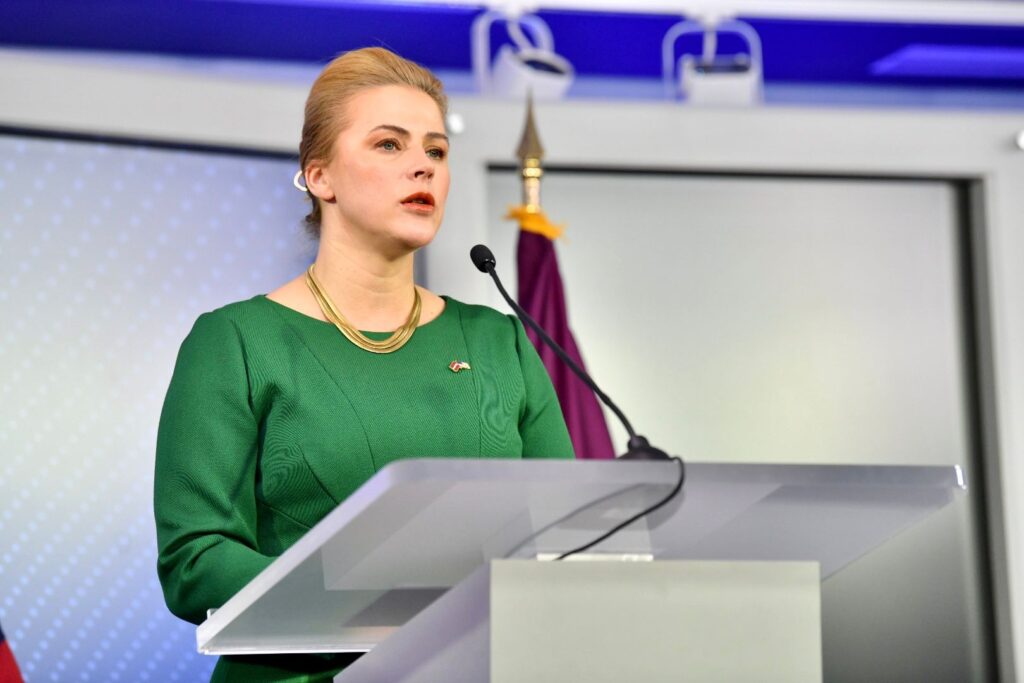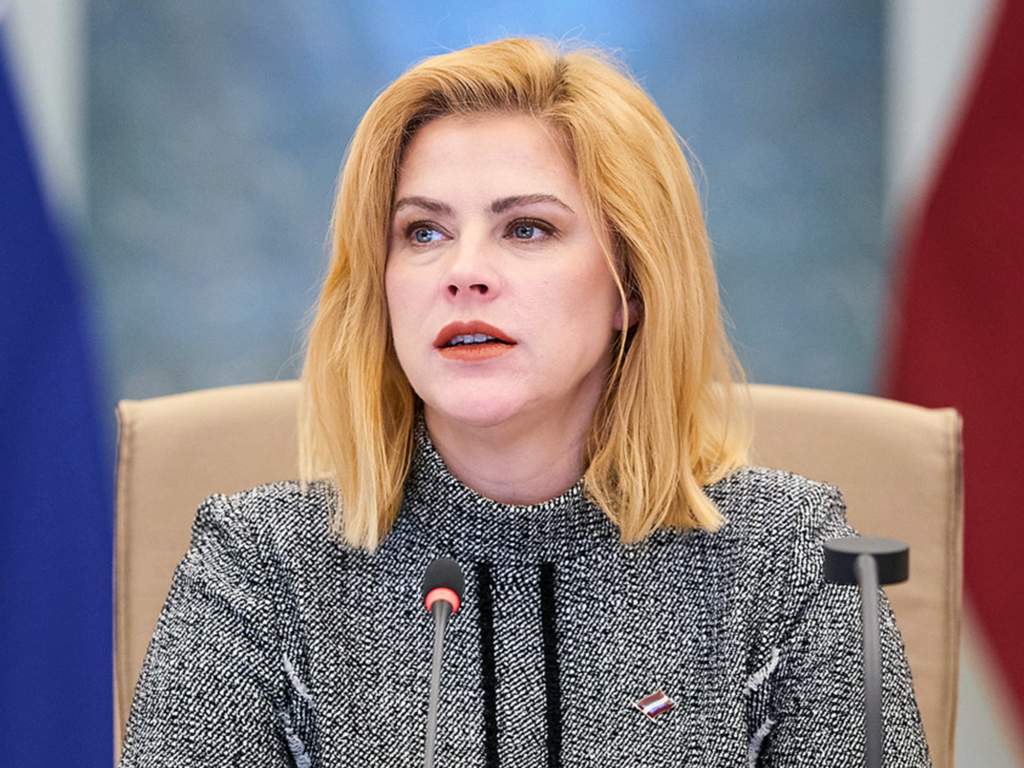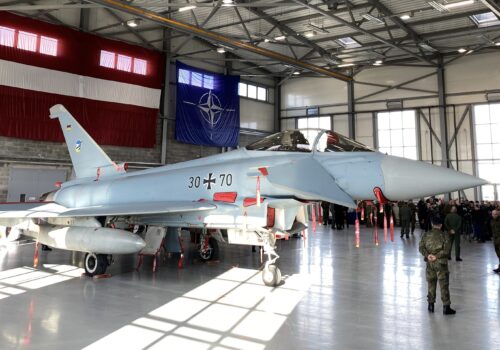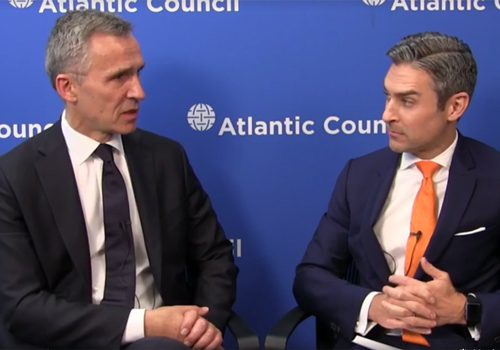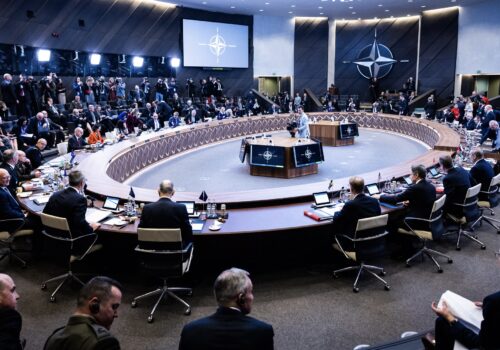Watch the full event
“Almost every debate in Europe starts and ends with issues about Ukraine and our military capabilities,” said Latvian Prime Minister Evika Siliņa at an Atlantic Council Front Page event on Wednesday. “We as Latvians have done a lot trying to really establish our own defense capabilities,” she said, “which are much stronger than they were two years ago.”
A Baltic state bordering Russia on NATO’s eastern flank, Latvia is approaching the twentieth anniversary of its accession to the Alliance. Since Russia’s full-scale invasion of Ukraine, Latvia has significantly increased its investment in security, spending 2.25 percent of its gross domestic product on defense in 2023. Siliņa said leaders across Europe have changed their thinking on security over the past two years. “We understand that we need to do more, and we have learned lessons from this war—unfortunately very expensive lessons,” she said.
Ahead of NATO’s Washington summit in July, the Latvian prime minister outlined her priorities for defending Europe from Russia’s aggression amid battlefield challenges for Ukraine, stalled US aid for Kyiv in Congress, and upcoming elections in the United States and the European Parliament that could shake up the transatlantic alliance.
“If we are cooperating, we can beat” Russia in its attempt to subjugate Ukraine, said Siliņa. “I believe we still need to fight for democracy . . . And democracy is costly. It costs something, but we are ready to pay the price.”
Below are more highlights from this discussion on Latvia’s role in NATO, the importance of continuing to aid Ukraine, and how the Alliance can enhance deterrence against Russia, which was moderated by CNN Pentagon correspondent Oren Liebermann.
Defending Ukraine—and democracy
- Siliņa highlighted the stakes of Ukraine’s struggle against Russia for all of Europe’s democracies. “If Ukraine will fail, we will all see the consequences,” she said, which is why “it is very important that we speak loud about what we can do more” to aid Kyiv.
- Siliņa emphasized the important role that economically integrating Ukraine with Europe plays in bolstering Kyiv’s security. “They have to see the potential that they can produce and feed their own people” while at war, because “nothing threatens a country more than internal threats” such as widespread poverty and hunger. “It is important to have this cooperation and trade with Europe and other countries” so that Ukraine can grow its economy and keep businesses afloat, she added.
- While acknowledging that there would need to be a significant amount of negotiation to make it happen, Siliņa said she “would like to see Ukraine in NATO.”
The Russian threat
- “We have been a loud voice within Europe, trying to explain that Russia is a threat,” said Siliņa. “I remember Soviet times,” she added, recalling how difficult it is to live in a country without freedom of speech.
- Confronting the threat that Russia poses to Europe also requires breaking from economic dependence on Moscow. Latvia, she said, is “still in the process of getting more and more independent economically” from Russian gas and oil. But, she said, the country has made “bold decisions” geared toward weaning itself off this dependence.
- Russia, Siliņa said, “will not understand the language of diplomacy.” Rather, “they usually understand the language of power, so I believe our own power comes out of our own abilities to be secure.”
- Of Russian President Vladimir Putin, Siliņa said “he keeps his power while he can suppress his own people. I don’t know how long it can be in place, because if we remember the Soviet Union, it was very similar. And, still, the Soviet Union collapsed.”
Plans for NATO’s Washington summit and beyond
- Siliņa named three top priorities for the NATO summit in Washington this July: concrete plans of action on aiding Ukraine, regional deterrence in the Baltics, and the containment of Russia.
- Siliņa praised the regional defense plans that were approved at last year’s Vilnius summit, saying they will be “very effective” at defending the Baltic states once implemented. However, she acknowledged that NATO needs to “put more effort into executing those plans” and that the Alliance is “still capable of proceeding much faster.”
- With NATO Secretary General Jens Stoltenberg stepping down in October, the Alliance members must choose a new leader this year. Siliņa would like the next NATO secretary general to “have a vision of Eastern European countries’ protection and deterrence and defense.” She also said she would prefer the next secretary general to be from a country that spends at least 2 percent of its gross domestic product on defense.
Daniel Hojnacki is an assistant editor on the editorial team at the Atlantic Council.
Watch the full event
Further reading
Wed, Mar 13, 2024
NATO should establish a Baltic Security Initiative at the Washington summit
New Atlanticist By Franklin D. Kramer, Hans Binnendijk
The Baltic nations are justifiably concerned that they could be the next targets of a reconstituted Russian military.
Tue, Jul 3, 2018
Defining Success at NATO’s Summit: Political Unity and Military Readiness
New Atlanticist By
NATO’s July 11-12 summit in Brussels will be defined by two basic objectives: demonstrating political unity and resolve and advancing military readiness. The latter provides the means necessary to deter and defeat adversaries. Only with the former can this community of democracies fully leverage those capabilities. Both are critical to the effectiveness and long-viability of […]
Tue, Mar 12, 2024
NATO’s decision process has an Achilles’ heel
New Atlanticist By
The Washington Summit in July should address the problem before a crisis exposes this vulnerability.
Image: Latvian Prime Minister Evika Siliņa speaks at the Atlantic Council on March 13, 2024.
